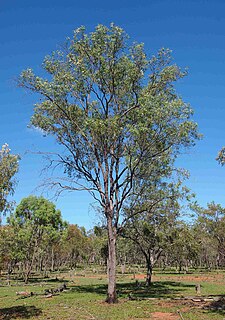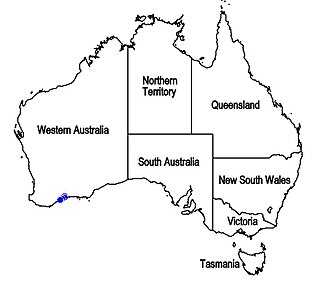
Centrolepidaceae are a family of flowering plants now included in Restionaceae following APG IV (2016). The botanical name has been recognized by most taxonomists.

Centrolepis is a genus of small herbaceous plants in the family Restionaceae known as thorn grass scales, with about 25 species native to Australia, New Zealand, New Guinea, and south-east Asia as far north as Hainan Dao. APG III system classifies this genus in the Centrolepidaceae family.
Centrolepis glabra, commonly known as smooth centrolepis, is a species of plant in the Restionaceae family.

Eucalyptus exserta, commonly known as Queensland peppermint, peppermint, bendo, yellow messmate or messmate, is a species of tree or a mallee and is endemic to eastern Australia. It has hard, fibrous bark, lance-shaped adult leaves, flower buds in groups of seven, white flowers and hemispherical or cup-shaped fruit.
Baeckea exserta is a shrub found in central Western Australia.

Hemiphora exserta is a flowering plant in the mint family Lamiaceae and is endemic to the south-west of Western Australia. It is a sprawling shrub with its branches densely covered with white, woolly hairs. Its leaves are rough and wrinkled and the flowers are deep pink or dark red, curved and tube-shaped with spreading petal lobes on the end.
Pterostylis exserta, commonly known as the exserted rufous greenhood, is a species of orchid endemic to the south-west of Western Australia. Both flowering and non-flowering plants have a large rosette of leaves flat on the ground and flowering plants have up to seven pale, transparent green and white flowers with brownish lines.
Centrolepis alepyroides is a species of plant in the Restionaceae family and is found in Western Australia.

Centrolepis aristata, commonly known as pointed centrolepis, is a species of plant in the Restionaceae family and is found in areas of southern Australia.
Centrolepis banksii is a species of plant in the Restionaceae family and is found in northern parts of Australia.
Centrolepis caespitosa is a species of plant in the Restionaceae family and is found in Western Australia.
Centrolepis cephaloformis is a species of plant in the Restionaceae family and is found in southern Australia.
Centrolepis curta is a species of plant in the Restionaceae family and is found in Western Australia.

Centrolepis drummondiana is a species of plant in the Restionaceae family and is found in Western Australia.

Centrolepis eremica is a species of plant in the Restionaceae family and is found in Western Australia.
Centrolepis humillima, commonly known as dwarf centrolepis, is a species of plant in the Restionaceae family and is found in Western Australia.
Centrolepis inconspicua is a species of plant in the Restionaceae family and is found in Western Australia.
Centrolepis mutica is a species of plant in the Restionaceae family and is found in Western Australia.

Centrolepis pilosa is a species of plant in the Restionaceae family and is found in Western Australia.

Centrolepis polygyna, commonly known as wiry centrolepis, is a species of plant in the Restionaceae family and is found in Western Australia.








